Why can Aspirin can promote DNA repair and prevent cancer?
- Normal Liver Cells Found to Promote Cancer Metastasis to the Liver
- Nearly 80% Complete Remission: Breakthrough in ADC Anti-Tumor Treatment
- Vaccination Against Common Diseases May Prevent Dementia!
- New Alzheimer’s Disease (AD) Diagnosis and Staging Criteria
- Breakthrough in Alzheimer’s Disease: New Nasal Spray Halts Cognitive Decline by Targeting Toxic Protein
- Can the Tap Water at the Paris Olympics be Drunk Directly?
Why can Aspirin can promote DNA repair and prevent cancer?
- Should China be held legally responsible for the US’s $18 trillion COVID losses?
- CT Radiation Exposure Linked to Blood Cancer in Children and Adolescents
- FDA has mandated a top-level black box warning for all marketed CAR-T therapies
- Can people with high blood pressure eat peanuts?
- What is the difference between dopamine and dobutamine?
- How long can the patient live after heart stent surgery?
Why can Aspirin can promote DNA repair and prevent cancer?
Aspirin (Aspirin, acetylsalicylic acid), since it was launched in 1898, has been in clinical use for more than a hundred years and has become one of the three classic drugs in the history of medicine.
It is still the most widely used antipyretic, analgesic and anti-inflammatory drug in the world, and it is also used as a standard preparation for comparing and evaluating other drugs.
In recent years, Aspirin has been found to be effective in many diseases, and even has certain preventive and therapeutic effects on major diseases such as neurodegenerative diseases , cardiovascular diseases , and cancer .
Recently, researchers published a research paper entitled: Aspirin protects against genotoxicity by promoting genome repair in the journal Cell Research .
This study shows that Aspirin , in addition to its well-known anti-inflammatory effects, also has a good anti-radiation effect, through the acetylation of histone H4K16, which enhances chromatin decompression, thereby enhancing the recruitment of repair factors at DNA damage sites for homologous Recombination (HR) repair.
The discovery of Aspirin as a regulator of chromatin structure and repair provides a new mechanism that could explain many of its much-lauded health benefits , including cancer prevention .
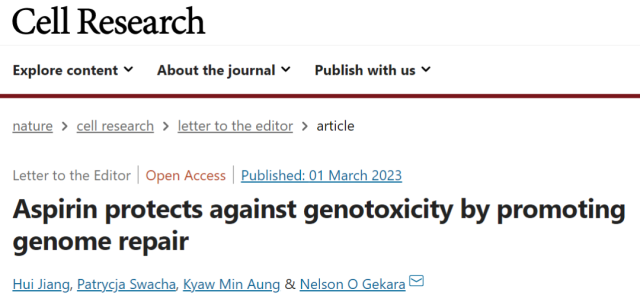
The huge damage caused by the nuclear explosion in World War II led people to look for measures to combat radiation. Since then, the leaks at the Chernobyl nuclear power plant and the Fukushima nuclear power plant have further deepened people’s awareness of the hazards of radiation.
In fact, the staff, pilots and astronauts near the radiation source, as well as the patients who have received radiotherapy for a long time, also need to prevent radiation hazards. However, despite decades of research, there is still no safe, efficient, and economical radiation protection tool.
In cancer treatment, bone marrow failure is the leading cause of death after radiotherapy. Therefore, protection of the bone marrow is a major goal in the development of radiation countermeasures.
Inflammation is a key consequence and driver of radiation-induced tissue damage, and considering the anti-inflammatory effects of Aspirin , the research team explored the use of Aspirin to prevent radiation hazards.
In this study, the research team found that Aspirin prevented radiation-induced bone marrow ablation and inhibited radiation- induced induction of inflammatory genes , including Ifnb1 , Mx1 , and Tnfa , in mice and in bone marrow-derived monocytes .
Pattern recognition receptors (PRRs) , including Toll-like receptors (TLRs) , RIG-I-like receptors (RLRs) , and cytoplasmic DNA sensors (CDSs), are central to the initiation of inflammation and cell death.
To assess whether Aspirin’s radiation protection was due to suppression of PRR-driven inflammation, the research team compared wild-type (WT) mice with mice deficient in PRR signaling.
Similar to WT mice, Aspirin protected the bone marrow of knockout mice deficient in both TLR and RLR pathways or CDS against radiation and suppressed the expression of inflammatory genes.
This means that the myelosuppression observed in the experiment is not related to PRR-driven inflammation, nor is the radioprotective effect of Aspirin related to its anti-inflammatory effect.
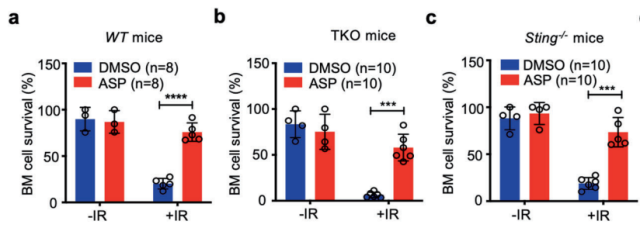
DNA double-strand breaks (DSBs) are the most deleterious result of radiation, which may lead to chromosomal abnormalities in cells, the formation of micronuclei (Micronuclei) , HEK293 cells are defective in PRR signaling, lack prostaglandin peroxide synthase (COX1 and COX2) , a key mediator of inflammation and pain, and the best-known target of Aspirin.
Aspirin was able to inhibit radiation-induced micronucleus formation in HEK293 cells, suggesting that this effect was independent of its anti-inflammatory activity.
When HEK293 cells cultured at low temperature on ice were irradiated (preventing their spontaneous DNA repair) and then transferred from ice to 37°C to allow DNA repair, Aspirin-pretreated cells were able to repair DNA double-strand breaks more rapidly.
In addition, Aspirin also accelerated the repair of DNA double-strand breaks induced by the anticancer drug doxorubicin .
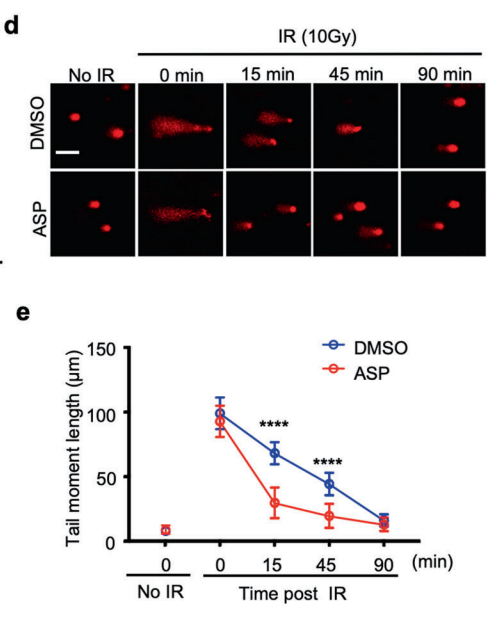
DNA double-strand breaks (DSBs) are repaired by homologous recombination (HR) and non-homologous end joining (NHEJ) .
Results based on a green fluorescent protein (GFP) reporter system showed that Aspirin promoted HR repair but not NHEJ repair. BRCA1 and 53BP1 are key checkpoint proteins for HR and NHEJ repair, respectively.
Aspirin enhanced the recruitment of BRCA1, whereas the NHEJ repair protein 53BP1 was not recruited to sites of DNA damage. Thus, loss of BRCA1 significantly slowed the accelerating effect of Aspirin on DSB repair.
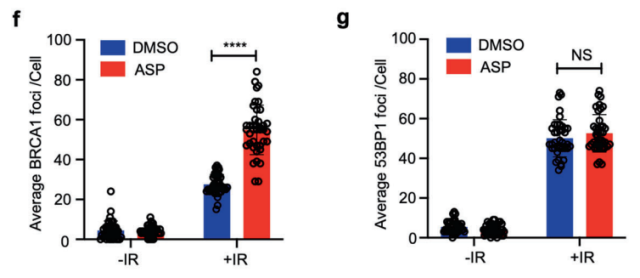
Chromatin decompression is critical for the recruitment of DNA repair mechanisms at sites of damage.
The N-terminal tail of histone H4 is the center of internucleosome interactions, and acetylation of histone H4 lysine 16 (Ac-H4K16) is critical for reducing nucleosome-nucleosome stacking and chromatin compaction Important to allow the recruitment of repair proteins. And Aspirin can promote Ac-H4K16.
The research team further isolated chromatin from mouse bone marrow cells, consistent with the ability to accelerate DNA break repair in vivo, Aspirin-treated mice increased Ac-H4K16, and the level of γ-H2A decreased after radiation, γ-H2A is DNA Damage sign.
When monitored further, the Aspirin-treated mice lived longer and exhibited relatively milder radiation symptoms.
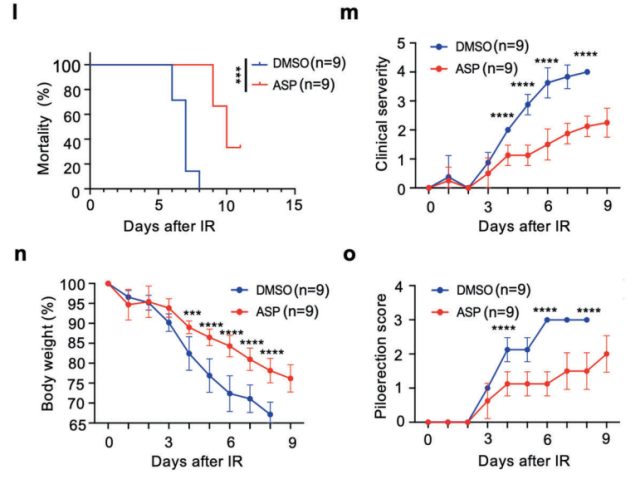
The therapeutic effect of Aspirin is thought to be due to its ability to suppress inflammation, and mechanistically, Aspirin was originally reported to achieve this effect by inhibiting COX1 and COX2.
This latest study found that although Aspirin also inhibits inflammation by blocking multiple PRR pathways, in addition to its anti-inflammatory effects, Aspirin is also a potent amplifier of homologous recombination (HR) -based DNA double-strand break (DSB) repair .
Specifically, Aspirin enhances chromatin decompression through acetylation of histone H4K16 , thereby enhancing the recruitment of repair factors to DNA damage sites for homologous recombination (HR) repair.
DNA double-strand breaks (DSBs) are harmful to health because, in addition to potentially triggering cell death, if not repaired or repaired incorrectly, they can lead to chromosomal deletions and translocations that can lead to long-term harm, including cancer and genetic disorders .
Furthermore, DSBsare alsoresponsible for inflammation,a key driver ofradiation/chemotherapy-induced tissue damageIn addition to acceleratingthe repair of DSBs, Aspirinmay also indirectly promote genome protection by inhibiting
Thus, the ability of Aspirin to inhibit inflammatory pathways and promote DSB repair through homologous recombination (HR) underscores its potential in the management of healthy diseases driven by inflammation and genomic instability.
Furthermore, the discovery that Aspirin is a regulator of chromatin structure and repair provides a new mechanism that could explain many of its much-lauded health benefits , including cancer prevention.
Paper link :
https://www.nature.com/articles/s41422-023-00783-6
Why can Aspirin can promote DNA repair and prevent cancer?
(source:internet, reference only)
Disclaimer of medicaltrend.org
Important Note: The information provided is for informational purposes only and should not be considered as medical advice.



